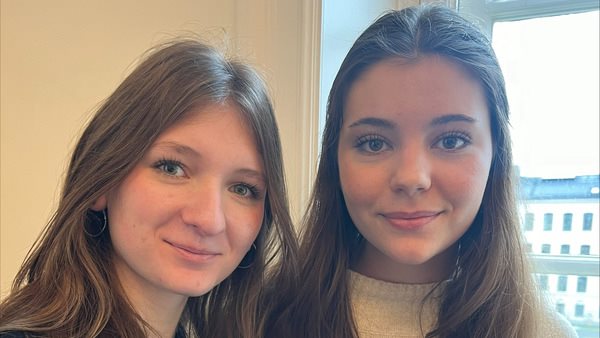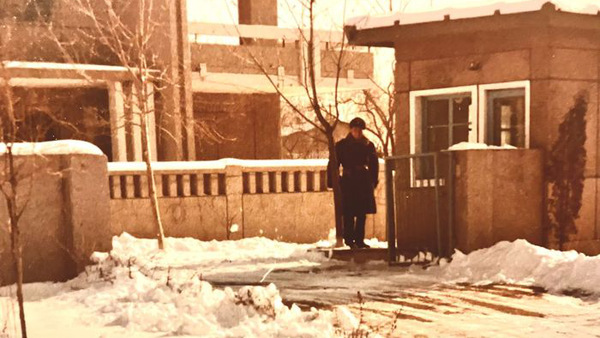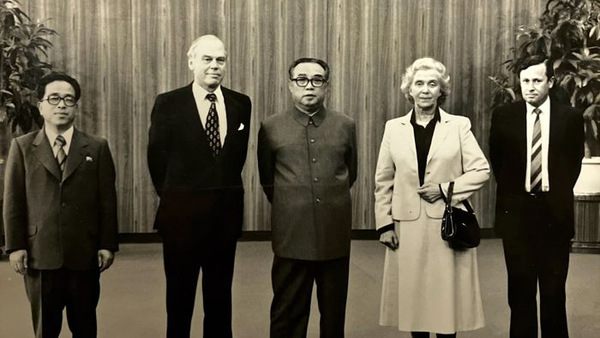Living in North Korea as Sweden’s ambassador in the 1980s: “It’s difficult to describe.”
My grandfather is a retired ambassador and has been to a lot of different countries. He has many interesting stories but I chose to interview him about his time as Sweden’s representative at the Embassy of Sweden in North Korea, during Kim Il Sung’s rulership in the 80s.

Ida Kiesow (vänster) och Sofia Almcrantz Correia (höger)
By Ida Kiesow
Ida Kiesow: How did you get the job as Sweden’s representative at the Embassy of Sweden in North Korea?
Ingolf Kiesow: Well, before North Korea I lived in Venezuela, which I loved very much. If I was going to continue my job at the Swedish Embassy in Venezuela, it would be for two more years and I was sure that if I stayed any longer, I would’ve never wanted to leave Venezuela again. Then I was offered the assignment in North Korea. It seemed very exciting because it was such a special and intriguing place. It was also a huge step in my career as I was only 39 years old, which was considered very young for that type of job, so it was a big promotion.
Ida Kiesow: Where did you live and how was it?
Ingolf Kiesow: I lived at the Residence in the Embassy-compound in Pyongyang, next to the Finnish and the Pakistani offices. My home, the Residence, looked like a plain, gray, square, cement box and was around 300 square meters. It was located 40 to 50 meters away from our office building, with a wall between and a gate to the office with two guards as surveillance. The garden at my house had a swimming pool and lots of different fruit-trees. Along with the flowers in the flowerbeds, the staff also grew edible plants for food. I had a cleaner and a chef that worked in my house, and a chauffeur. I also had two interpreters, one who was the Head interpreter that spoke German, and another that spoke Swedish. The reason I had two interpreters was so that they could make sure that the other one didn’t say something that he shouldn’t.
Ida Kiesow: Who lived with you at your house?
Ingolf Kiesow: My children travelled with me from Venezuela to North Korea and stayed there a couple of days until they went back home to my ex-wife in Sweden. They came back and visited me on the holidays every year.
Ida Kiesow: Did you ever feel lonely living there all by yourself, or did you perhaps make any new friends in North Korea?
Ingolf Kiesow: A few days before I was going to move to North Korea, I met up with a woman named Ingrid, who already had been working at the Embassy in Pyongyang for a year. She taught me how everything worked, including any information I was going to need before going to North Korea. She was my only Swedish coworker and lived in a small apartment in the office building. I spent a lot of my time with Ingrid, so I never really felt that lonely. My children also visited me twice a year after all. I did make some friends from the other Embassies too. Because my dad was from Germany, I could speak fluently with the people from the East German Embassy and therefore made some friends there. Aside from them, I usually only socialized with the very few other Embassies from democratic countries there. I also became good friends with my Head interpreter, but we never showed that in public because he probably would’ve been punished for being friends with me. So we only spoke with each other when we knew we were completely alone.
Ida Kiesow: Were there any special rules that you had to follow?
Ingolf Kiesow: It wasn’t really ”what rules we had to follow” but what we were allowed to do. Everything was very restricted: If we went out in the city, we always needed to have someone to accompany us and we could only go to certain places there. There was a special convenience store for foreigners, where we were allowed to shop. Everything meant for the locals was basically off-limits to us. If we wanted to take a trip outside Pyongyang or to the countryside, on a trip that wasn’t arranged by the government, we had to get a special permit beforehand. Like in the city, there were only a few places we were allowed to visit. We were strictly forbidden to throw away or ruin any pictures of the Leader of North Korea, and there were lots of pictures…. Almost every newspaper had at least one picture of him. Once a diplomat from another country had left his child unsupervised in his house with a newspaper that showed a picture of ’’The Great Leader’’ (he was always referred to as “The Great Beloved Leader, Marshall Comrade Kim Il Sung”). When he returned, his kid had drawn all over the portrait. The diplomat got a huge scolding after this.
Ida Kiesow: How could they have known about the drawing if the child was alone in their home?
Ingolf Kiesow: We were technically never truly alone. There was almost always someone observing us in some way.
Ida Kiesow: Can you explain how you were being watched?
Ingolf Kiesow: Like I mentioned before, every building in the Embassy area in Pyongyang, each had two guards in watchtowers in front of the building, including my house. You would think they were there to protect the embassies, but instead of facing the outside of my house, they did the opposite. Their purpose was actually to guard us. Every time I took a morning jog around the Embassies, the guards at each Embassy I passed reported to the guard at the next Embassy that I was heading their way. They tried to spy on us in other ways too. It was common sense for all the foreign diplomats to never speak loudly about important information or secrets because of the hidden microphones around and especially when any of the staff were near. We could also hear how they listened to our phone calls on a third line because it would click every time the conversation was recorded. Sometimes I even heard unfamiliar voices in Korean during my phone calls. I have a few stories about how I’ve caught them spying on us.
Ida Kiesow: Would you like to share one of those stories?
Ingolf Kiesow: The most interesting story is when I saw a little man crawling up from a gap under the stairs in my residence. When he realized that I had seen him, he quickly disappeared down the gap with a frightened expression on his face. I understood that something weird was going on, so I decided to follow him down the gap. It led to some kind of basement and a long tunnel. While continuing through the tunnel, I realized that I was now under our office building. There were steel pipes going up to every room and a funnel at the end of each pipe so that I was able to hear everything they said. I kept walking through the tunnel until I reached the Pakistani embassy. I could hear them clearly as well. After that I didn’t want to go any further because I was afraid of being detected. That’s when I understood to what degree we were being watched.
 A picture taken from my grandfather’s yard, featuring one of the guards.
A picture taken from my grandfather’s yard, featuring one of the guards.
Ida Kiesow: What was life like for civilians in North Korea?
Ingolf Kiesow: It’s difficult to describe. The only North Koreans I came in close contact with were my staff and people working within the government. One thing I saw was how the higher ranking people treated poor people badly and ordered them around. It was very centered around your status. One thing I can say for certain is that they had it rough. Despite the government trying to hide it from us, the food and other resources in North Korea were scarce. I often saw my staff picking food from the garden in my residence and putting it down their pockets. I always pretended like I didn’t notice, because I knew how horribly they would be punished if they got caught, and how bad their circumstances already were. It’s noticeable that the North Korean citizens weren’t the top priority. For instance, how the government built big skyscrapers in an attempt to show off how well developed and modern their country was. When you actually take a closer look at them, however, you notice that they lacked heating radiators and elevators. Those who lived in the apartments on the higher floors had to climb many stairs every day to get home. There was also a political commissar in the hallways on each floor in every civilian’s apartment building. The doors to the apartments had no locks so the commissar could barge in at any time to inspect every apartment.
Ida Kiesow: How did they act towards you?
Ingolf Kiesow: The North Koreans usually acted very anxiously, afraid of doing anything wrong. When I was shopping for groceries in the foreigners’ convenience store, the interaction with the people working there was little to non-existent. They always kept quiet and tried to avoid talking to me as much as possible. This occurred everywhere. Anytime one of us foreigners tried to start a conversation with a North Korean, it always felt tense. I don’t blame them, though. They were also monitored and would get in a lot worse trouble than I would’ve gotten, if they were to do something wrong. For example, one time at a dinner, a North Korean production leader got drunk and started telling us about his admiration for Sweden’s social security. Next day, he disappeared. He was later classified as a political traitor and was sent to a labor camp, while his family got sent away to the countryside. It happened pretty often that someone lost all of their citizens’ rights just because of a small mistake.
Ida Kiesow: Did you see any of the labour camps?
Ingolf Kiesow: They were generally concealed and secret, but I once managed to get a glimpse of one while driving on a road. It was surrounded by a high fence and in each corner was a watchtower with a guard. It looked almost like a concentration camp. When I mentioned it to my interpreter, he said that he didn’t see anything there and denied the whole existence of the camp. The next time I drove on the same road, the camp was completely gone. Apparently there were other Embassies that had also asked about that camp, so I suppose the government decided to remove it.
Ida Kiesow: Speaking of the government, did you ever meet Kim Il Sung?
Ingolf Kiesow: Yes, when I got invited to banquets at the palace, and at the airport when all the diplomats had to greet an important guest, he was there too.
Ida Kiesow: What was he like?
Ingolf Kiesow: He was a man with a great presence that radiated power and authority. It was a bit scary how everytime he walked in, the room immediately got taken over by his intimidating aura. We actually had a business negotiation with him one time, and he had memorized all the numbers and individuals down to every detail.

This is a picture of Kim Il Sung (in the middle) and my grandfather on the right.
Ida Kiesow: What were your worst and best memories of your time in North Korea?
Ingolf Kiesow: Like I mentioned before, me and my Head interpreter got along very well. Once, we were out on an outing and got a drink that we placed in the car. Later on it disappeared. Then, the Head interpreter was suddenly gone. After a long time he eventually came back but with a kidney injury. He secretly asked me if I could bring him some medicine from Sweden, which I did. Later when we were in the sauna, I noticed he had bruises on his back. I asked about it and he just said that they came from the interrogations. It was eventually revealed that it was the other interpreter who had accused him of stealing the blueberry drinks. The younger interpreter was the son of a party official and I already knew he wanted to become Head interpreter, so it was pretty obvious why he had accused him. I later on had the satisfaction to fire him. To see my Head interpreter suffer and be treated so badly is probably my worst memory.
The best memory is when Ingrid and I got engaged and we were permitted to take a private trip to the Diamond Mountains, with only my Head interpreter present. It was spring and incredibly beautiful. We walked along the stream with the breathtaking mountains around us. It is a very important memory for me.
Ida Kiesow: Do you have anything more to add?
Ingolf Kiesow: Only that I’m worried. About the decisions that were made by North Korea this past year to send troops to support Russia in the war against Ukraine and about what will happen in the future. The relationship between North and South Korea has worsened over the years to the point where Kim Jong-Un discontinued the policy of reunification and described South Korea as their main enemy. I don’t know what that will lead to, but I am concerned.
